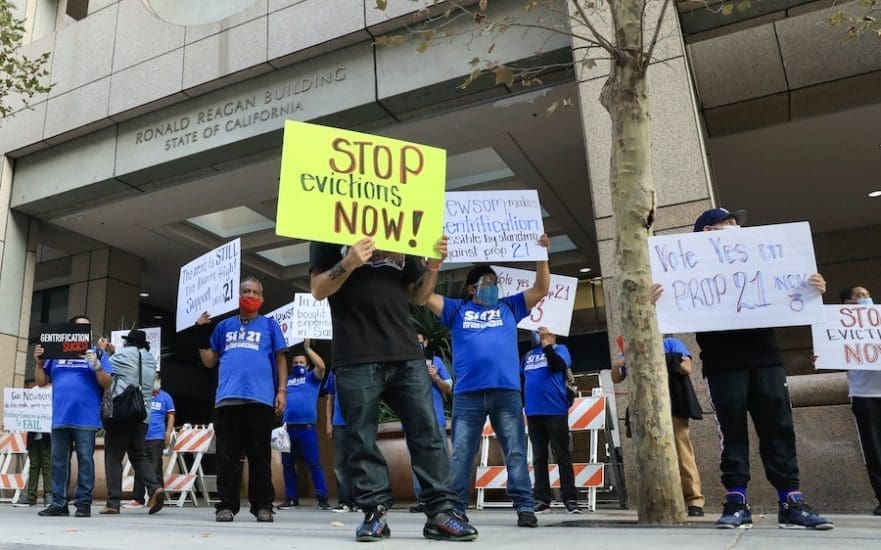While Proposition 21 was defeated on Election Day, more than 340 housing justice groups, social justice organizations, labor unions, and political leaders enthusiastically endorsed the ballot measure. With the housing affordability and homelessness crises still impacting millions of middle- and working-class Californians, that statewide coalition will continue to fight for stronger renter protections, especially as the COVID-19 pandemic rages on.
Prop 21 was the statewide ballot measure that put limits on unfair, sky-high rent increases, reined in corporate landlord greed, and would have prevented homelessness. Top experts at USC, UCLA, and UC Berkeley agree that sensible rent limits are key for stabilizing California’s housing affordability crisis.
That’s why U.S. Senator Bernie Sanders, labor and civil rights icon Dolores Huerta, Congresswoman Maxine Waters, the California Democratic Party, the ACLU, the California Nurses Association, Black Lives Matter – L.A., and California’s housing justice movement threw their full support behind Prop 21.
Yet massive campaign contributions from corporate landlords played a major role in the defeat of Prop 21. The real estate industry, including corporate landlords such as Blackstone Group, Essex Property Trust, and Equity Residential, contributed a whopping $86 million to No on Prop 21.
“The Prop 21 campaign was outspent more than two to one by our opponents, opposed by Democratic outlier Governor Gavin Newsom — going against his own California Democratic Party, which unanimously endorsed 21 — but received full-throated endorsements from a who’s who of respected local, state, and federal California Democratic office holders,” said Michael Weinstein, co-founder and president of AIDS Healthcare Foundation, the lead sponsoring organization of Yes on Prop 21.
He continued, “However, this is not the end: our fight for housing justice will continue. Martin Luther King, Jr. famously said, ‘The arc of the moral universe is long, but it bends toward justice.’ Together with our growing coalition, we will carry on in the fight for housing justice!”
Many organizations that endorsed Prop 21 spoke about the need for more moral decency and urgent solutions for California’s housing affordability and homelessness crises.
“One of the most profound impacts on the public health is housing insecurity,” California Nurses Association President Zenei Cortez, RN, explained. “Millions of Californians who are rent-burdened are forced to make painful choices between paying the rent or paying for prescription drugs and medical services. They are one paycheck away from living on the streets where the public health challenges are even more severe.”
The California Nurses Association was a major contributor to the Yes on Prop 21 campaign.
SEIU California also backed Prop 21, which wasn’t surprising. Members of SEIU local United Service Workers West, which primarily represents janitors, airport workers, security officers, and stadium and arena workers, face devastating unemployment because of the COVID-19 pandemic.
“The vast majority of our members are people of color, immigrants, and low wage workers. Even before the pandemic, our members were already struggling with housing insecurity in a very severe way,” said SEIU USWW Policy Director Christian Ramirez. “So long as we continue to treat housing as a luxury, a commodity and not as a human right, we will continue to have this crisis that has just devastated the working class in California.”
Ernie Powell, a consultant for Social Security Works, which endorsed Prop 21, explained that seniors are too often targets for eviction by predatory landlords seeking higher rents and bigger profit margins.
“Senior homelessness has increased by 20 percent just this year,” Powell said. “Older Californians are rent burdened, which means that renters from the age of 65 to 79 spend half their income on rent. For California renters aged 80 and older, that number is 42 percent… So, is there a moral imperative here? You’re darn right there is.”
Susan Hunter, an organizer and advocate for Housing Is A Human Right, the housing advocacy division of AIDS Healthcare Foundation and another leading organization behind Yes on Prop 21, noted that the narrative of what we think about homelessness is critical to solving the crisis.
“We have people who are full-time employees living out of tents and cars simply because they can’t afford the rent,” said Hunter. “We have to recognize that for so many people out there, drugs and alcohol were not the reason why they ended up on the streets. That’s what they did to cope with the fact that they ended up there.”
It all adds up to more work that needs to be done to help California’s 17 million renters, pressuring California legislators and pursuing different ways to address the housing affordability and homelessness crises.
“Unfortunately, for several years now the California legislature and Governor Newsom have not come up solutions commensurate with the monumental problems we face here in California with housing and homelessness,” said AHF president Michael Weinstein. “That is why we took [Prop 21], and Prop 10 before it, directly to voters. In the immediate future, AHF will now concentrate more energy directly on housing the homeless and extremely low-income people through AHF’s Healthy Housing Foundation and our innovative, far less costly housing model, adapting and refurbishing old SRO hotels and repurposed as a longer-term housing solution.”
Weinstein added, “We pioneered this model in late 2017 and now have nearly 700 people — including many parents and their children — in eight former hotels and motels throughout Greater Los Angeles. We are pleased to see that some other organizations and cities — notably, San Diego — are exploring and deploying this adaptive reuse model to address their housing and homelessness crises.”
With millions of lives hanging in the balance, California’s housing justice movement, including AHF and Housing Is A Human Right, will continue to fight hard to bring urgent relief to the most vulnerable. The battle against predatory landlords and Big Real Estate is far from over.
Karen Ocamb, the author of this article, is an award-winning journalist.

